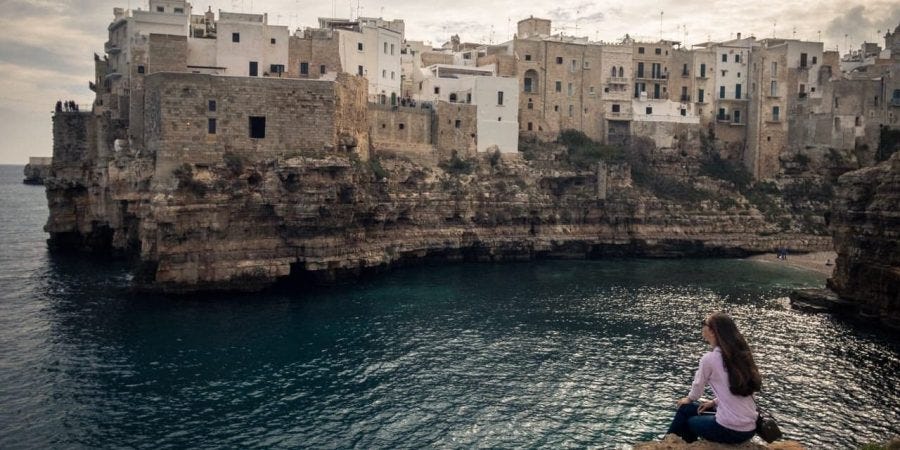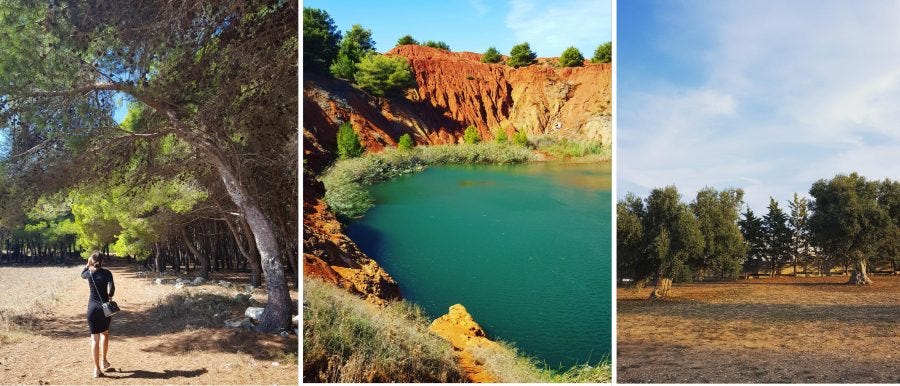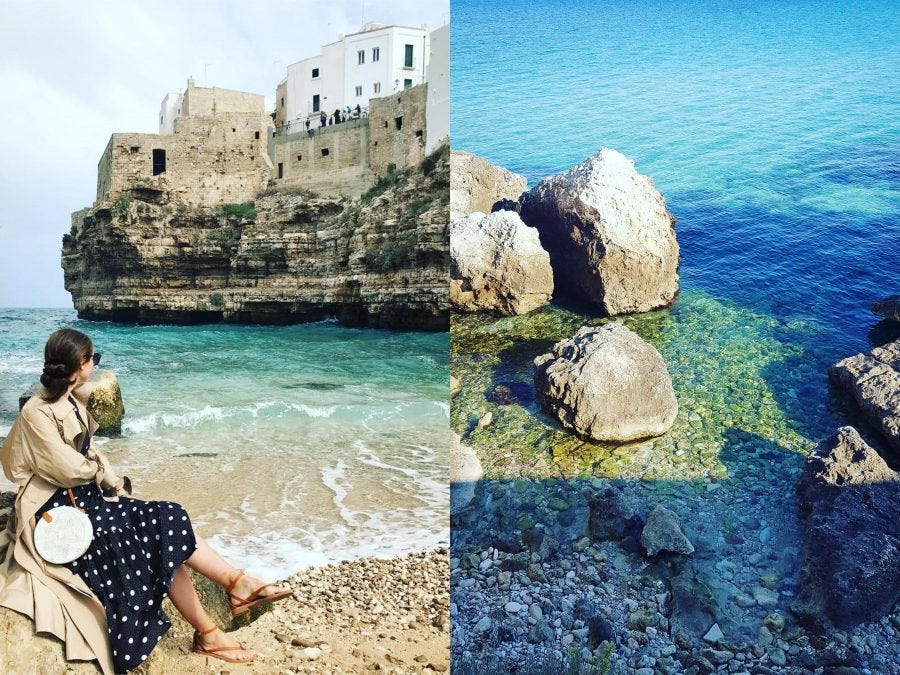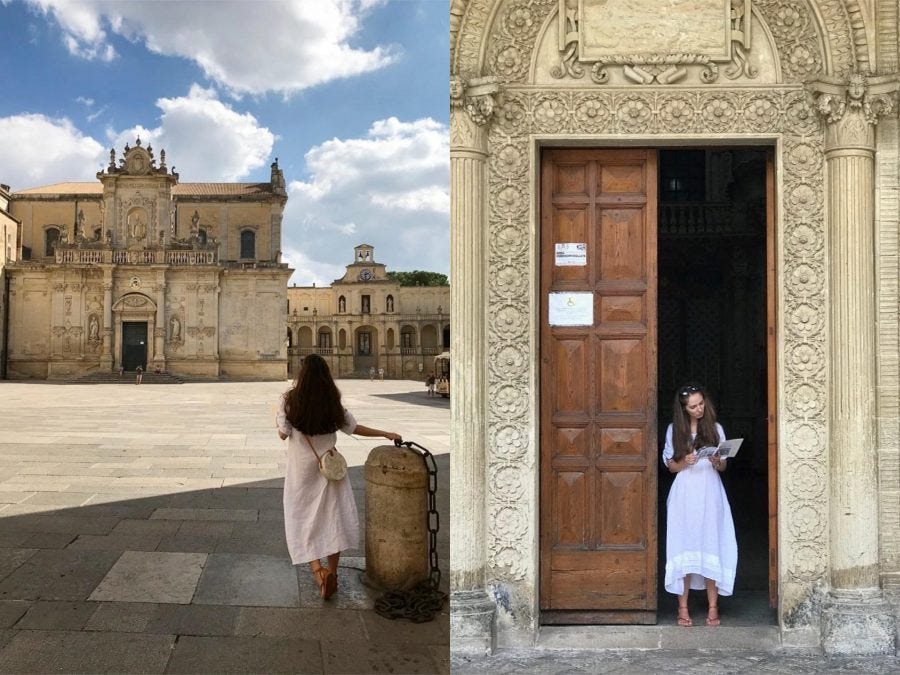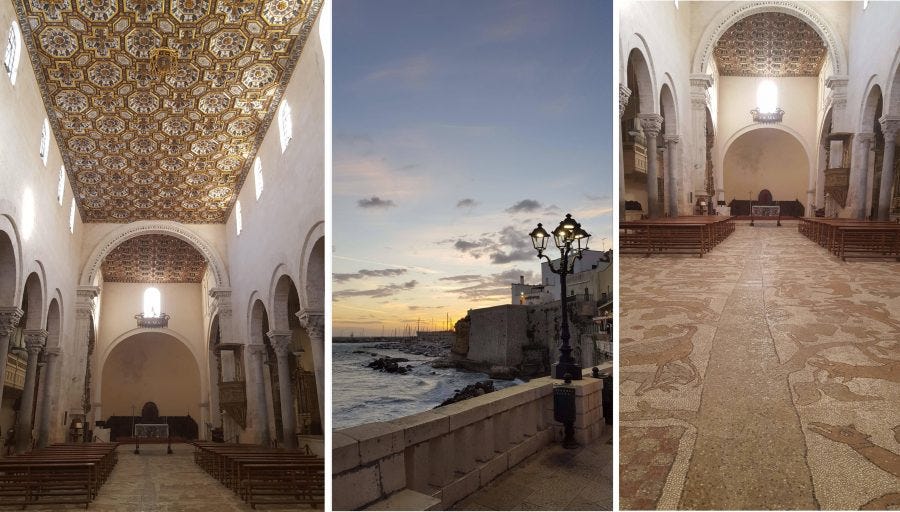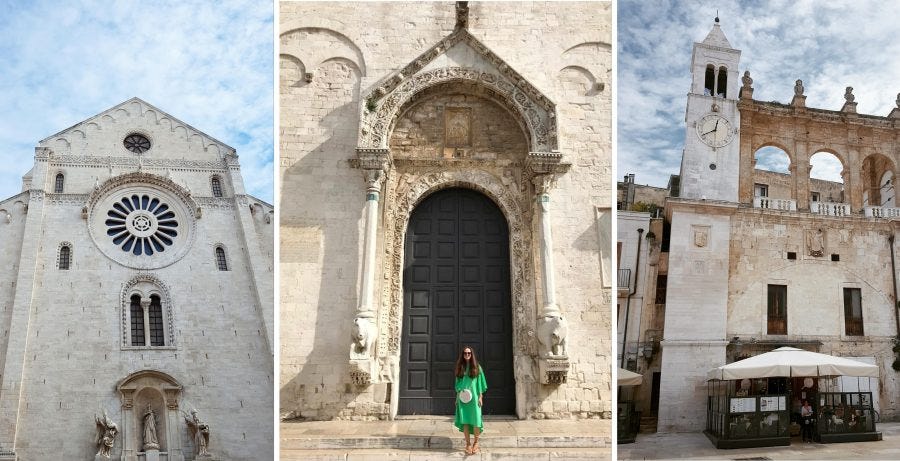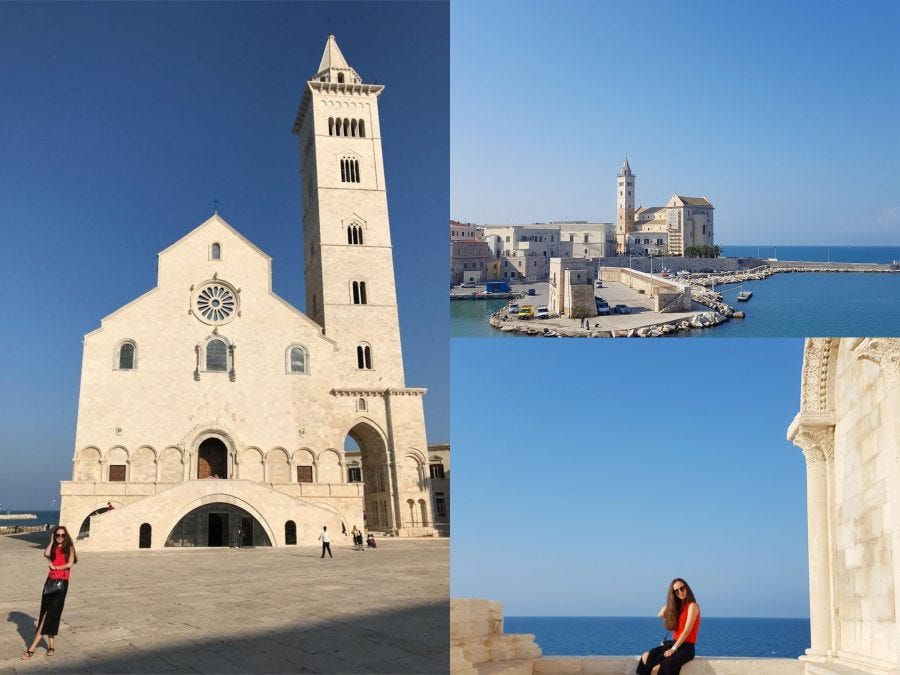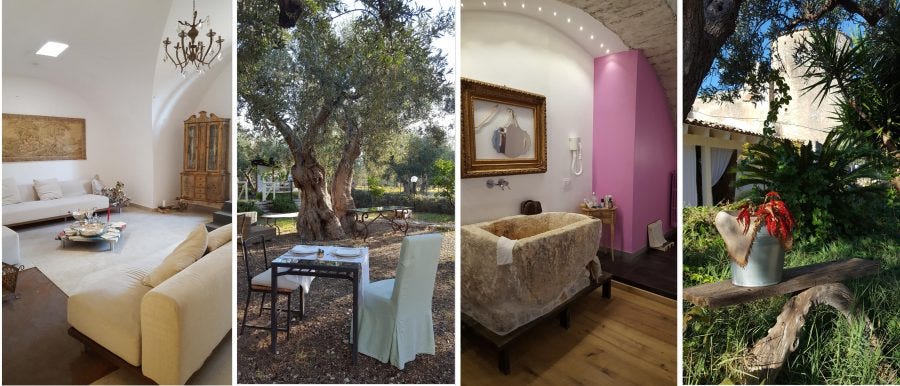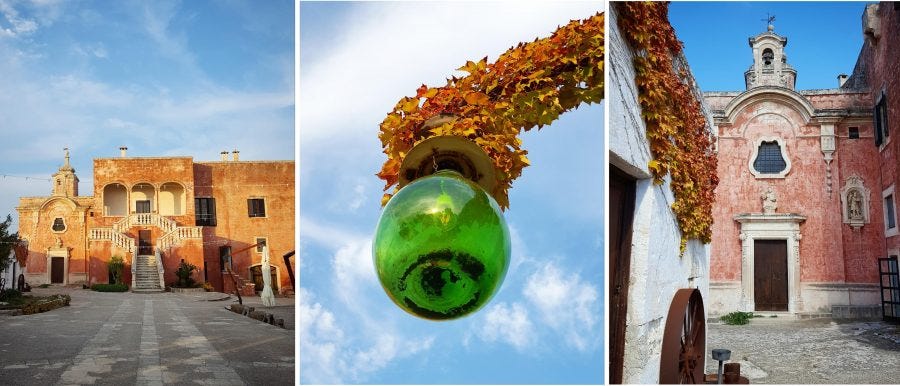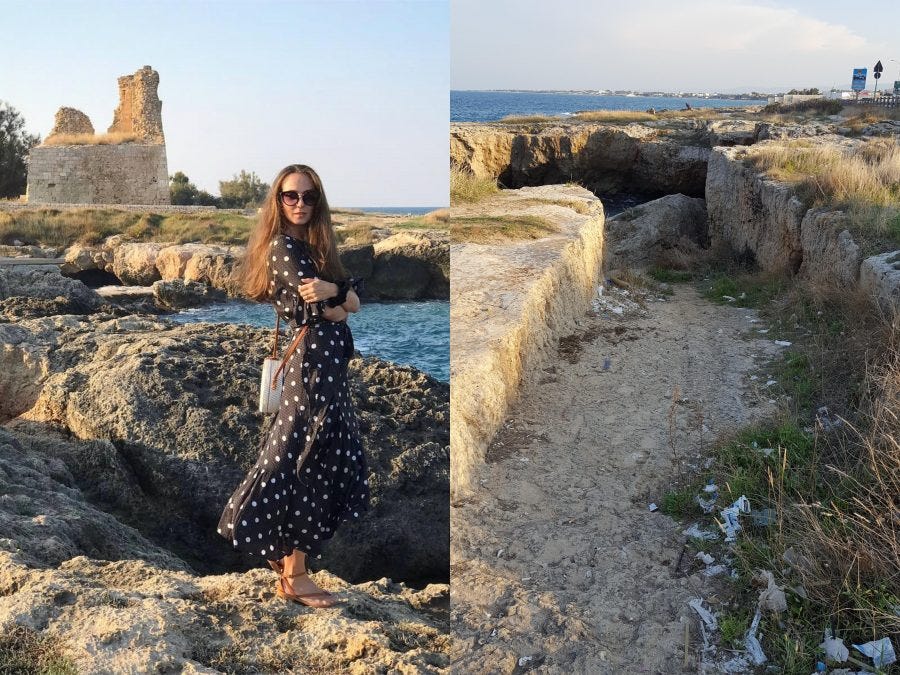To Puglia or NOT to Puglia?
Puglia, this well-known region of southern Italy, has been on my travel wish-list for many years now. Its rich history and culture, the warm-hearted Pugliese people, its sunny coasts, and Puglia's more than praised cuisine were just a few of the reasons that convinced me to fly to Brindisi and start a 12-day road trip through the beauties of the Apulian lands.
I must add that my journey didn't comprise just Puglia. Throughout the nearly 4 weeks I spent in Italy, I went exploring three other southern regions: Basilicata, Calabria, and Campania. However, the Italian adventure started and ended in Puglia and in this article, I will focus exclusively on this region.
I took some time to think about what and mostly if I should write this article. Because let me warn you from the very beginning: a part of what you are going to read won't be nice!
I thought about the lovely people I met while in Puglia, about the honest conversations we had and about my dear Pugliese friends. I thought it would not be nice from me to say anything but marvels about their homeland. But I also thought about the image Puglia has managed to project on the tourism stage and about those thousands and thousands of lovely images "made in Puglia" that Instagrammers and bloggers post on their accounts.
It did not come as a surprise to realize that the content creators little they want or care to also speak about the real problems that Puglia is facing today. Those problems that cannot be seen or can be more or less easily avoided from their postcard-like pictures. Looking at their posts and images, one might think that Puglia is perfect with spotless clean cities, romantic secluded beaches, and turquoise clear waters. In reality, Puglia is far from being "that" perfect. And let me clarify one thing: I do not search for perfection when I travel. But I do expect to feel safe and I do appreciate a lot to see that tourism expansion goes hand in hand with responsibility and care for the environment. Sadly, in Puglia safety is a major issue and the environment is an abstract notion.
But first, let's go through those reasons that make Puglia a great destination, worth exploring!
To Puglia! 👍🏻
1. The geography
While I cannot tell you Puglia is very diverse in terms of its geography, it definitely has its beauty. Except for the Gargano Peninsula in the north and the foothills of the Apennine Mountains in the extreme north-west, Puglia is a rather flat region, serving as an excellent agricultural land. In fact, the beauty of Puglia resides particularly in that scarcity of vegetal and animal species, imposed by its geography. Its red soils covered with very green pine trees that sometimes reach the rocky coasts are one of Puglia's trademarks. Equally, its huge plains and hills covered with olive groves and vineyards constitute the most typical landscape "made in Puglia". You can expect to drive for long kilometers and only see that.
2. The coastline & the beaches
Puglia's coastline runs for nearly 800 km and is lucky to be washed by two seas: the Adriatic on the east and the Ionian Sea on the west. While the Adriatic coast is mostly rocky, the Ionian coast is characterized by beautiful sandy beaches that sometimes alternate with more rocky sectors. Both sides are equally impressive and picturesque, with the color of the water varying from light to deep blue, and from turquoise to emerald green. The lighthouses that guard the coasts of Puglia are another interesting feature of the region. It is worth mentioning that Puglia is Italy's region with the highest number of lighthouses. The history of these remarkable constructions can go back for centuries when the need to protect the landmass against the pirates and enemies was imperative. Many of the lighthouses are open to visitors and they offer breathtaking views over the seas of Puglia.
3. The historical & cultural background
Despite the fact that many tour-operators and travel agencies are trying to sell Puglia almost exclusively for its beaches, I must say the region has a very rich history and culture that starts in the 1st millennium BC when the Illyric and the Italic tribes settled here. Throughout the centuries Puglia feel in the hands of different conquerors, flourishing during the Spartan Greeks, during the Romans, and during the Normans. Each of them has left their traces in Puglia and their heritage can still be seen and felt throughout the region. It might come as a surprise to find out that in the southern Salento there's a group of villages that still speak an old variety of Greek, known here as Grico. Honestly speaking, I have spent a lot more time exploring the towns and the little villages of Puglia than on the beach. My conclusion is that there's definitely a lot to learn and a lot to see!
4. The Baroque towns & churches of Puglia
Rumor has it that if you want to see the most beautiful Baroque churches of Italy, you should head to Puglia. I personally love the Baroque period in art and architecture and I could not wait to see the fine examples of Puglia. What I can tell you now, for sure, is that I have seen countless stunning examples and that some of them have left me jaw-dropping. My favorite, by far, is the Baroque town of Lecce, a masterpiece that somehow has reminded me of another Baroque gem - Noto, from Sicily. Lecce has a history of nearly 2500 years and is recognized by UNESCO as a World Heritage Site. The Piazza del Duomo with the Duomo is simply breathtaking, while the Basilica di Santa Croce displays one of the most complex Baroque facades I have ever seen. On my list, I would equally add Chiesa di San Niccolo e Cataldo of Lecce and Duomo di Otranto (partly Baroque), with a superb mosaic running all the way through the nave. Otranto, Ostuni, Locorotondo, and Cisternino are also a "must-see" while in Puglia, with beautiful examples of Baroque architecture.
Lecce
Lecce
Ostuni
Otranto
Locorotondo
5. The other cities, towns & villages of Puglia
Puglia is not only about Baroque architecture. In fact, many other styles are equally well represented. From medieval constructions to massive Norman Castles (Castello di Bari, Castello di Manfredonia, Castello di Monopoli etc) and superb Romanesque churches (Basilica di San Nicola di Bari and Catedrale di Trani are perhaps the best examples), Puglia has it all. The Chiesa di San Marco della Greca from Locorotondo is a beautiful example of Gothic architecture, while the "trulli" houses are a unique trademark for Puglia's famous Itria Valley. When it comes to "trulli" architecture, Alberobello is without any doubt the most famous town of Puglia. Also, the most crowded. Despite its beauty, I must say the mass tourism has made it nearly impossible to enjoy the beauty of the place the first day I went. Because I did not want to keep a bad taste in my mouth regarding Alberobello, I decided to return another day. I don't know if the cloudy weather or the fact that it was Monday morning kept the crowds away, but it definitely allowed me to walk around and enjoy the city without the bustle. As I already mentioned, the dry stone houses with conic roofs known as "trulli" are not to be found only in Alberobello. Well-preserved "trulli" can be also admired in the nearby Locorotondo, Cisternino, and Martina Franca.
Alberobello
"Trulli" houses of Alberobello
Bari
Trani
6. The food
One topic that could hardly be argued against when it comes to Puglia is the food of the region. Often regarded as one of Italy's most exquisite cuisines, the Pugliese dishes will leave your mouth watering. I literally loved everything I ate in Puglia. The beauty of this cuisine resides in its variety and in its long preserved traditions. If you love seafood, there's no better place to indulge yourself in a sophisticated world of tastes. Puglia is also Italy's region where people love to eat raw seafood, which sometimes can be quite a challenging experience for the beginners. Given the proximity to the sea, you can be sure that seafood is always fresh and tasty. Meat, countless types of cheese, vegetables and of course, fresh pasta (especially the "orecchiette") are also part of the daily menu. The olives and the best olive oil are never off the table.
Raw tuna fish, raw seafood, seafood soup and a mix of local delicacies.
7. The people
Perhaps I should have started my list with this point since all the Pugliese people I have met throughout my journey, except for an episode I have already wrote about here, deserve an honest accolade. Few places in the world have left me so many friends as Puglia has done it in just 12 days. Their warmth and kindness went beyond being hospitable and respectful. Our Pugliese hosts did their best to make our stay as pleasant as possible and many times they have exceeded my expectation. Below, I'll give you just a few examples of what being Pugliese (thanks to them) means to me.
Valentina and her husband Giuseppe own and run a lovely B&B - Agriturismo la Palascia, near Otranto. They were our first hosts and throughout our 4-day stay they spoiled us with the tastiest home-made breakfast and they gave us the best advice regarding the region. Valentina was also very kind to recommend me a nearby dentist for a little emergency I thought I had.
I could not reach the dentist she recommended me, as many cabinets are closed on Monday in Puglia. Instead, I went to see a dentist in Lecce (which I found on google pretty much randomly), who agreed to see me last minute, right before the closing of the cabinet. The staff waited for me and received me warmly and tried to comfort me since dentists always give me a sort of a panic. Finally, I had the doctor see me and check the problem. After a thorough check-up, he concluded that there was nothing to worry about and eventually I myself admitted to being a little paranoid when it comes to pain. Though I took 20 minutes of his time, the doctor didn't want to charge me for his service. Instead, he wished me a nice holiday, prescribed me a painkiller (just in the events I needed it) and recommended me a few nice restaurants in town.
Katia was our host in Trani. She manages a small and superb B&B (Agora B&B), located right in the center of the city. Katia would come every morning to bring us fresh pastries and delicious fresh local cheese. She would play us music and she would constantly ask if we needed anything else. However, what impressed me the most about her is not the fact that she would always be in time in the morning, bringing the local delicacies. No. What impressed me the most is the fact that the day we arrived she was waiting for us right in front of the building, on a free parking spot that she was trying to block for us, so we could park our car safely. She had also bought us a parking ticket for 2 hours, in order to spare us the headache of searching the shop where they sell the tickets.
Paolo is an old friend of mine and though he's been living in Rome for ages now, he is a true Pugliese. Paolo has been my consultant ever since I decided to take this trip and all the way through our journey. He's been giving me the best advice in terms of restaurants and sightseeing, but also he's been a great support when our holiday turned abruptly bad while exploring Campania. But about this episode, I shall write in a new post. To all the people I have met and interacted with while in Puglia, I can only say "Thank you!" from the bottom of my heart.
8. The art scene
It should not come as a surprise to anyone the fact that Puglia, like all Italy, is a land of creative people. If you love art ( I do), you will find a multitude of art galleries and studios that display amazing artifacts. I do not remember nor how many art galleries I have visited during the time in Puglia, neither the number of artworks I have fallen for. But I can tell you that had I had the necessary budget, I would have not doubted for a second to purchase at least a few pieces. Ceramic is a long tradition very well preserved in Puglia (Cutrofiano and Grottaglie are the most famous in this sense) and is incredible the beauty of the artifacts the Pugliese artisans produce.
9. The old "masserie"
The "masserie" are old (sometimes very, very old) farmhouses, located throughout the agricultural land of Puglia, usually surrounded by olive groves. In recent times many of them have been transformed into "agriturismi", allowing tourists to see and tour and live at the farm. I did not want to miss this opportunity and three of the accommodations I have chosen were old "masserie".
- Agriturismo la Palascia, that I have already mentioned above is a simple, yet beautiful farmhouse, surrounded by olive trees and located a few km away from Otranto.
- B&B Barone Gambadoro is a beautiful "masseria" situated not far away from the city of Manfredonia. It bears the name of the barons who built this fortified "masseria" between the XVI and XVII century. Within its premises, it also has a little church that the current owners use during important family events, and during Easter and Christmas celebrations.
- Masseria Spina Resort is an outstanding property, located right outside the charming town of Monopoli. The old fortified farmhouse dates back to the Middle Age and ever since it went through different stages and looks. The current facade is a Baroque one, just like the Chiesa dell’Immacolata, the little church built right next to the main building - Masseria Spina Grande. The inside is especially particular, with old pieces of furniture and beautiful works of art. In other words, if you ever thought of spending a night in a museum, this might very well be the right place.
Now, I wish my review stopped here and there was nothing ugly to add to it. But sadly, the second part of my experience in Puglia is equally honest and worth telling.
NOT to Puglia! 👎🏻
I know this statement might sound very harsh and unjustified, especially after I walked you through all the beauties of Puglia. But Puglia has also disappointed me. The lack of care towards the environment is something of magnitude here. And so is the safety issue. Let me put it more clear! I have never seen anywhere else within the EU borders so much trash dumped in the public space, as I have seen in Puglia. The public space seems to be perceived as "no-one's space" and therefore, the place where anyone can dispose of their waste, just as they please.
Take a look at the pictures below. They were taken in one of the most iconic towns of Puglia: Polignano a Mare. A simple search #Polignanoamare will reveal countless superb pictures of this place and idyllic descriptions of the old romantic white houses perched on the rugged cliffs. And yet, despite being indeed a lovely romantic town, Polignano a Mare is not exempted from the trash the tourism (and not only) produces. As you can see, the trash is freely left all along the coast or hidden in between the rocky crevasses.
Now, if you think this is just an isolated case, I am sad to inform you it is not. A few km away from Monopoli, another jewel town of Puglia, close to the Archaeological Park of Egnazia ( the biggest archaeological park of Puglia, of nearly 40 ha), I took this other picture.
As I already said, it can be an easier or harder job to find a clean spot where to take that stunning picture that will show on your social media accounts and everyone will press like for. I also found my clean spot, however, I would lie if I didn't tell you that most of that part of the coast was more like my second picture. Full or missing trash-bins, plastic bags, snack packaging, empty glass or plastic bottles, and dog excrement were part of the romantic panorama.
You might ask yourselves, as I have, who is leaving all this litter behind? The answer, I am afraid, is nor nice, neither easy. Of course, it would be easier to find a scapegoat, but that would not solve the problem. We could exclusively blame the tourists, but I don't think that would be the correct approach. We could blame the local people. But would that suffice? Given the circumstances, it would be more reasonable to just blame both. But let's not forget about the authorities, the public policymakers, the companies encharged with the trash collection, the education of the population that has to be aware of the importance of a clean environment! They all play huge roles and each of the players has to be aware of their responsibilities and duties.
I did a lot of reading after I returned from Puglia. While there's a lack of literature in English, I managed to come across a number of articles and debates in Italian. Blaming the other side seems to be the current approach to this issue. While locals feel invaded by tourists and tourists do not care about the host country, authorities fail to produce a solution. It is true, however, that on certain occasions the perpetrators will get fined. And that's pretty much all it happens. When few other travelers signalized the problem on TripAdvisor, the locals with hurt-egos simply told them to stay at home if they didn't like what they see. As simple as that. With all respect, I must say this isn't just a problem of tourism and overcrowding. I have seen with my own eyes people emptying their pockets in the middle of the street (and they were not tourists), throwing empty bottles on the road through the car window (not tourists again) and people walking with their dogs and not cleaning after their pet.
I also do not think the tourists are to be blamed for the piles of plastic bags full of waste that accumulate along the roads. Though you might find it hard to believe some people do drive on the highway with the sole purpose of disposing of the trash bags on the emergency exits. I have seen not one, but rather a few emergency exists that have been turned into real trash-wholes.
Of course, I have also read the explanation that trash collecting companies pass by, once in a while, and they collect the waste. While I do not know how often that happens, I honestly find this to be a ridiculous practice, encouraging rather than discouraging a wrong behavior. If you add the wind, sometimes very strong in Puglia, and the stray animals that scavenge the bags, you can get a clear picture of what dumping the waste along the road means. And if you cannot, have a look at the pictures below!
These pictures were taken in different spots across Puglia, some of them on national roads, some others on village roads near major attractions. At least 2 of the pictures were taken outside Alberobello, probably the most sought and the most advertised destination of Puglia. The quality is not the best, as I could not always stop to take a clear picture. I am sorry I never pulled aside the highway to take a picture of the emergency exits and show you clearly what I am talking about. To my defense, I will add that at the beginning I was truly bewildered and I still hoped it would only be an isolated case. I also assume that at that time I didn't really know I would be writing this post. It made me deeply sad and disappointed to discover this to be a common practice. And it makes me sad right now to write these lines.
Pointing out this is, however, not meant to be about my feelings. Though to some extent, it should be about that too. A holiday, at the end of the day, involves a cost and one expects to get the best experience in return. I have been told that Puglia has been experiencing an increase in the number of tourists only throughout the last 10 years and that the region is not ready to cope with the flow. It also seems to work as a valid explanation the fact that is one of Italy's poorest regions and unlike other Italian regions, it has no tourism tradition. The most recent statistics I managed to find seem to support the fact that Puglia is booming and that only in 2015 it received 3.4 million tourists (+3.4% than in 2014). Recent articles also position Puglia as one of Europe's booming regions, leading in terms of mass beach tourism. As expected, web search and social media channels play the most important parts in people's decision to come to Puglia. Sadly, the social media channels have no interest or do not feel responsible to address the environmental impact issue.
Like I already mentioned, throughout my stay in Puglia I have come across beautiful and hard-working people. I have stayed in local B&B's owned and managed by young and talented people, committed to ethical tourism and to environmental protection. Some of them recycled the waste. Some of them kindly asked us to separate the waste and so we did. Many of them spoke about feeling abandoned by the authorities, spoke about corruption and spoke about their struggle to keep their business alive. All of them agreed that there's a huge lack of education and awareness in terms of rights and responsibilities with regards to the public space. All this doubled by the incapacity of the authorities to engage the community in a battle for a clean environment. Failure to do so will only bring future destruction and will not create the right premises for a sustainable tourism.
In the same trash category, I will include the graffitis and the messages written on the trees, walls, doors, benches, and streets. I understand the beauty of the Italian language, the need for artistic expression and the desire to communicate your feelings to the beloved one. But all to a certain extent. When the streets and the walls are covered in desperate love messages for Giuseppe or Cinzia or with hearts stating the names of the visitors and the date they were there, it's not just pathetic (sorry guys, this is my opinion), it's a public good damage that needs to be punished accordingly. Though I must agree with the fact that this behavior is spread throughout most of Europe, Puglia is no exception.
Another big issue ( I would dare to even say the biggest) is the safety matter. Though many of us would love to think safety comes by default, reality shows us that this is not the case. And this is definitely not the case in Puglia, where at times I felt very uncomfortable. If you think this is a problem that affects most of the European big cities, you are right. That's totally the case and I was ready to be extra-cautious in a city like Bari, known as one of Italy's most unsafe cities (according to Wikipedia Bari ranks 4 in terms of crime). But not only Bari can turn out dangerous in Puglia. The mass tourism has also created excellent premises for thieves and burglars and criminals to perform successfully. In consequence, any little town and any beach can be a perfect spot to attack. Whenever our accommodations did not have a safe parking, we were advised to park in a place with video surveillance or in a monitored paid parking. Theft of and from cars is widespread and the perpetrators seem to have excellent skills when it comes to detecting the "new cars", belonging to tourists. Smashing the car windows at the gasoline stations, in traffic jams or at traffic lights is another common practice. I was left speechless when our host in Trani told us about the car theft the city has experienced throughout the summer. Later on, I noticed that many vehicles were carrying an extra security feature mounted on the wheel. To all this, you can add pick-pocketing, bag snatching, robberies and then you may want to stop for a second and ask yourself: what am I doing here? Am I saying that these episodes happen to each and every single tourist? No, I am not saying that. But the moment you relax, there's a high probability of you becoming a victim. To me, a holiday is also about relaxing. I am not saying relaxing to the point where you become ignorant of reality but giving your thoughts a moment of peace, where you don't have to worry all the time about your car, your belongings, or the people who are walking next to you. Puglia keeps you "en garde" all the time and takes a lot from your enjoyment.
Would I return to Puglia in the near future? The answer is NO. But this is just my personal choice and it has to do with my personal criteria and exigences. I am not, by any means, saying you should not visit Puglia. If you have an opportunity, you should. But be aware that Puglia is not just what you see on Instagram accounts and is not just what others want to make you believe it is!


